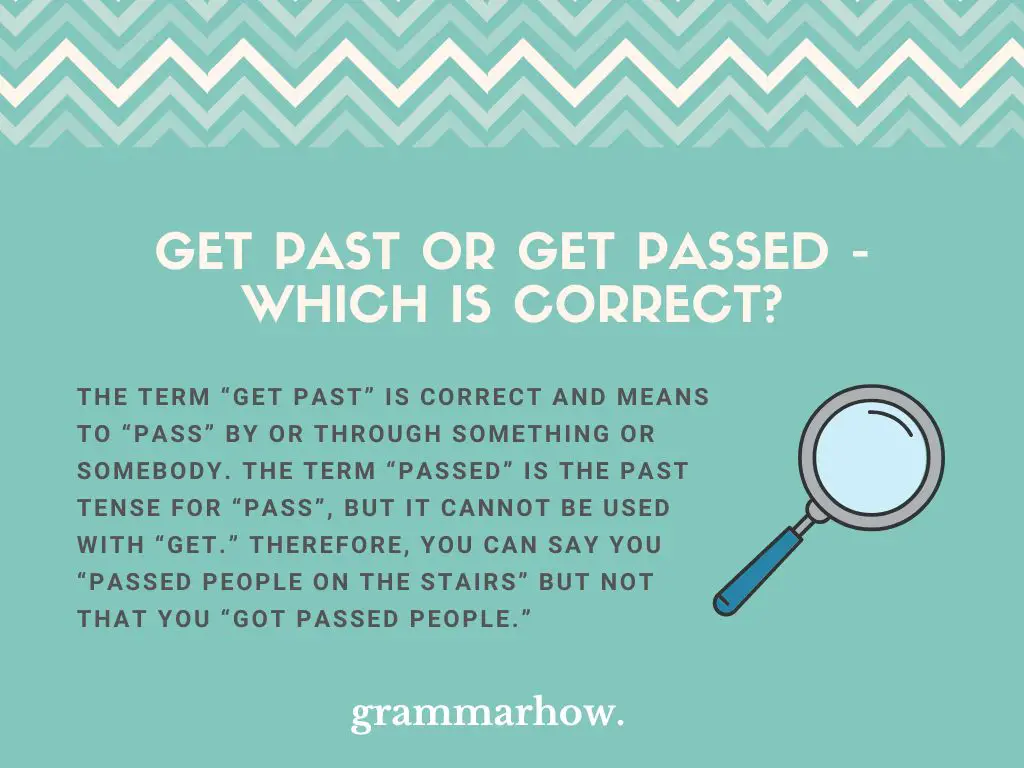The terms “get past” and “get passed” sound exactly the same, but are they the same, or are they different? This page explains both terms and shows how they can be used in sentences.
Get Past or Get Passed – Which Is Correct?
The term “get past” is correct and means to “pass” by or through something or somebody. The term “passed” is the past tense for “pass”, but it cannot be used with “get.” Therefore, you can say you “passed people on the stairs” but not that you “got passed people.”

The Cambridge Dictionary states that the word “past” is used as a preposition and adverb to indicate a “position further than a particular point.” The word is often used to describe the location of places or things that somebody has walked or driven “past.”
When combined with the word “get” to “get past”, it sometimes indicates that an effort was made or that “getting past” that particular thing may have been challenging.
In contrast, the term “get passed” is incorrect because of the word “get”, which cannot be combined with “passed.” If you remove the “get”, then the word “passed” by itself can sometimes but not always, be the same as “get past.”
Here are some examples where the meaning is the same:
- As soon as I got past the gas station, I ran out of gas.
- As soon as I had passed the gas station, I ran out of gas.
- Once I had gotten past the city center, the road was clear.
- Once I had passed the city center, the road was clear.
Here are some examples where only “get past” or “passed” are valid:
- I passed the English exam with flying colors.
- She passed me on the stairs, but she didn’t say hello.
- I couldn’t get past the people on the stairs because there were too many.
- I got past the final boss in that video game without any problems.
- Once I got past page 20, I lost interest in the book altogether.
Get Past
The term “get past” refers to passing from one place to another, often by or through something else. It can be used literally to refer to spaces, and it can also be used to refer to more abstract things, such as pages in a book or questions on an exam.
“Get past” is sometimes used in the same way that “get through” is used, which implies that there was some type of work or effort involved in “getting past” whatever you are referring to.
Here are some examples of “get past” in a sentence:
- I couldn’t get past question 3 in the exam because I didn’t know the answer.
- Once I had gotten past his resistance to my plan, everyone else agreed it was a good plan.
- Once I got past all the buses on High Street, there was no more traffic.
Get Passed
The word “passed” is the past tense of “pass”, and it cannot be used with the word “get.”
“Passed” can be used by itself and sometimes has the same meaning as “get past”. However, the two terms are not always the same and should not be used interchangeably unless you are confident they are the same.
Here are some examples of “passed” in a sentence:
- She passed her driving test first time, which surprised us all.
- Once he had passed by them and was out of sight, they started talking about him.
- We passed through customs quickly, but we waited for over an hour for our luggage.
Conclusion
The term “get past” is correct, and it means to “pass” by or through something. It can refer either to a literal object or be used metaphorically to indicate that you “got through” or “survived” a particular situation or obstacle.
In contrast, the term “get passed” is not correct because the word “get” cannot be combined with “passed.”

Martin holds a Master’s degree in Finance and International Business. He has six years of experience in professional communication with clients, executives, and colleagues. Furthermore, he has teaching experience from Aarhus University. Martin has been featured as an expert in communication and teaching on Forbes and Shopify. Read more about Martin here.
